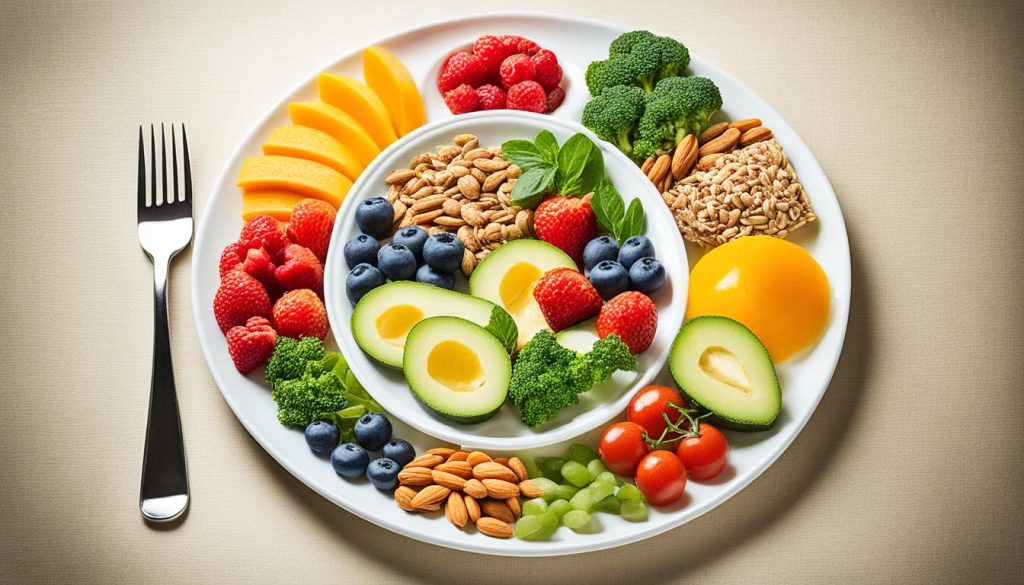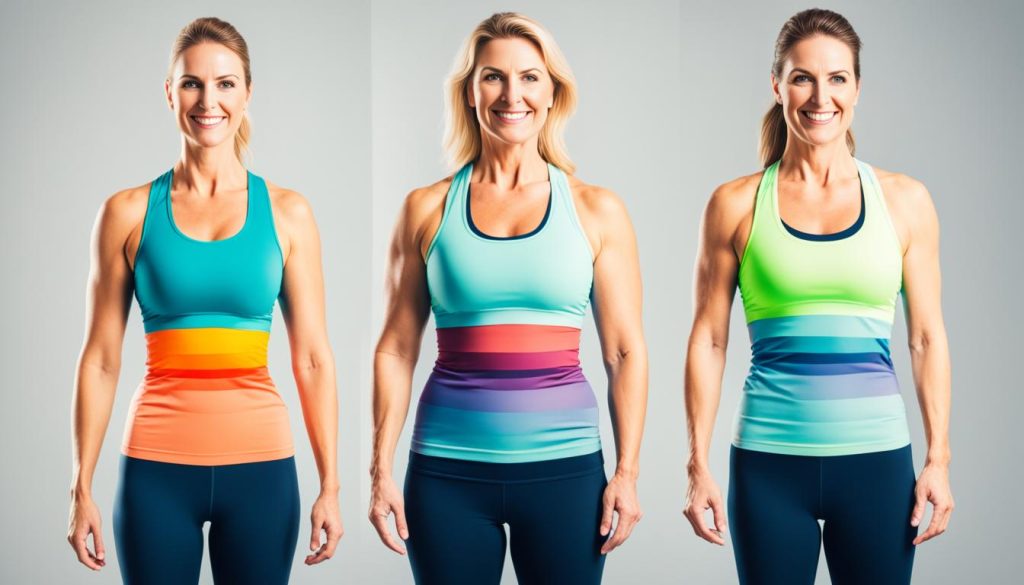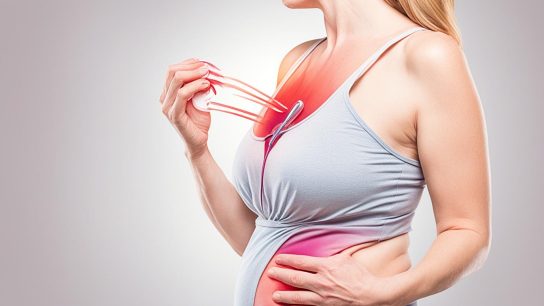Caloric intake is important for maintaining optimal health and energy levels. Finding the right balance in calorie consumption is vital to achieve and maintain a healthy weight. But how many calories should a woman eat in a day to support her overall well-being?
In this article, we will explore the daily calorie requirements for females and delve into the factors that affect their caloric needs. We will also discuss the importance of caloric intake for women’s health and the risks associated with both excess and insufficient calorie consumption.
Whether you are looking to maintain your weight, lose a few pounds, or adopt a healthier lifestyle, understanding the ideal calorie intake for women is an essential part of achieving your goals. Let’s dive in and discover how to nourish your body properly!
How Many Calories Should a Woman Eat in a Day?
Caloric intake plays a crucial role in maintaining a healthy body and supporting optimal bodily functions. The energy obtained from calories is essential for powering various cellular processes, including protein metabolism and the synthesis of essential molecules.
However, the impact of caloric intake goes beyond just providing energy. Women’s calorie consumption has a significant influence on overall health and well-being. On one hand, excess calorie intake can contribute to weight gain and increase the risk of obesity, which is associated with various health conditions such as heart disease, high blood pressure, diabetes, and certain types of cancer.
On the other hand, not consuming enough calories can also have negative effects on the body. Insufficient caloric intake can lead to nutrient deficiencies, muscle loss, a weakened immune system, and compromised cognitive function.

The Role of Clinicians
Given the importance of caloric intake for women’s health, it is crucial for healthcare professionals to educate individuals about healthy eating habits and the ideal calorie intake for women. By promoting a balanced diet and encouraging adequate caloric consumption, clinicians can help women maintain a healthy weight and reduce the risk of chronic diseases.
Striking a Balance
Achieving the ideal calorie intake for women involves finding the right balance between consuming enough calories for energy and avoiding excessive intake that can lead to weight gain and associated health risks. It is essential to focus not only on the quantity but also the quality of calories consumed.
An effective approach is to prioritize nutrient-dense foods, such as whole grains, lean proteins, fruits, vegetables, and healthy fats. These foods provide essential vitamins, minerals, and macronutrients while minimizing the intake of added sugars, unhealthy fats, and processed foods.
Incorporating regular physical activity into one’s routine further supports healthy caloric intake by enhancing metabolism and promoting overall well-being. Physical activity helps maintain a healthy weight, improves cardiovascular health, and boosts mental health.
Ultimately, understanding and meeting the ideal calorie intake for women is a personal journey that should be guided by healthcare professionals and individualized to meet specific needs and goals.
Health Risks of Excess and Insufficient Caloric Intake
When it comes to caloric intake, finding the right balance is crucial for a woman’s overall health and well-being. Both excess and insufficient caloric intake can have detrimental effects on the body, leading to various health risks.
Health Risks of Excess Caloric Intake
An excess caloric intake, especially from unhealthy sources, can contribute to weight gain and obesity. This not only affects a woman’s physical appearance but also poses serious health risks. Some of the health conditions associated with excess caloric intake include:
- Heart disease: Consuming too many calories, particularly from high-fat foods, can increase the risk of heart disease and other cardiovascular problems.
- High blood pressure: Excess caloric intake can lead to high blood pressure, increasing the risk of heart attack, stroke, and kidney disease.
- Diabetes: A diet high in calories, especially refined sugars and carbohydrates, can raise blood sugar levels and increase the risk of developing type 2 diabetes.
- Certain cancers: Obesity is a known risk factor for several types of cancers, including breast, colon, and ovarian cancer.
It is important to note that the quality of calories consumed also plays a significant role in these health risks. Consuming a calorie surplus from nutrient-poor foods, such as sugary snacks and beverages, can further contribute to these risks.
Health Risks of Insufficient Caloric Intake
On the other hand, not consuming enough calories can also have negative consequences for a woman’s health. Insufficient caloric intake can lead to:
- Malnutrition: When the body doesn’t receive enough calories, it may not be getting all the essential nutrients it needs, leading to malnutrition.
- Weight gain: Paradoxically, insufficient caloric intake can cause the body to go into starvation mode, leading to the storage of excess calories as fat.
- Organ damage: Prolonged insufficient caloric intake can damage vital organs, such as the liver and kidneys, compromising their functions.
It is clear that finding the optimal balance in caloric intake is crucial for maintaining a healthy weight and reducing the risk of various health conditions.

Factors Affecting Daily Caloric Needs
The daily caloric needs of an individual can vary based on several factors, including gender, age, weight, and activity level. It is important to understand these factors and their impact on caloric intake to maintain a healthy weight and overall well-being.
Gender
Caloric needs can differ between men and women due to variations in body composition and metabolism. Women generally have a lower muscle mass and higher body fat percentage, resulting in a lower daily calorie requirement compared to men.
Age
Caloric needs can also change with age. As we age, metabolism tends to slow down, leading to a decrease in daily calorie requirements. The energy expenditure for growth and development in childhood is higher compared to adulthood, necessitating different caloric needs for children compared to adults.
Weight
Body weight plays a crucial role in determining daily caloric needs. The energy required to sustain a higher body weight is greater, resulting in a higher recommended caloric intake. Conversely, individuals with lower body weight may require fewer calories to maintain their weight.
Activity Level
The level of physical activity also influences daily caloric needs. Those who engage in regular exercise or have physically demanding jobs may require additional calories to fuel their active lifestyle. Sedentary individuals, on the other hand, may need fewer calories to meet their energy requirements.
On average, adult women should consume around 2000 calories per day to maintain weight. However, it is important to note that this is a general guideline and individual needs may vary. Weight loss requires creating a calorie deficit, while weight gain requires a calorie surplus. It is essential to prioritize the quality of calories consumed, focusing on nutrient-dense foods rather than solely considering quantity.

By understanding the factors that affect daily caloric needs and making informed dietary choices, women can maintain a healthy calorie intake that supports their overall health and well-being.
Strategies for Healthy Caloric Intake
When it comes to maintaining a healthy caloric intake, women need to focus on incorporating nutrient-dense foods into their diet while avoiding sugary drinks, refined carbs, and ultra-processed foods. Here are some strategies to help you achieve a balanced and nourishing daily caloric intake:
Incorporate High-Quality Protein
Protein is an essential component of a healthy diet, as it helps build and repair tissues, supports a healthy metabolism, and keeps you feeling full for longer. Include lean sources of protein such as poultry, fish, tofu, and legumes in your meals. Try to have protein with every meal to meet your daily needs.
Limit Sugary Drinks
Sugary drinks can contribute to excess calorie consumption without providing any nutritional value. Replace sugary sodas, fruit juices, and energy drinks with water, herbal teas, or naturally flavored infused water. This simple switch can reduce your daily caloric intake while keeping you hydrated.
Stay Hydrated
Drinking enough water throughout the day is crucial for maintaining overall health and supporting your body’s functions. Adequate hydration can also help regulate your appetite and prevent overeating. Aim to drink at least 8 cups (64 ounces) of water per day to stay properly hydrated.
Exercise Regularly
Regular physical activity is key to maintaining a healthy weight and optimal caloric balance. Engage in activities that you enjoy, such as walking, dancing, cycling, or strength training. Aim for at least 150 minutes of moderate-intensity exercise or 75 minutes of vigorous-intensity exercise per week.
Reduce Refined Carbs and Ultra-Processed Foods
Refined carbohydrates, such as white bread, pasta, and sugary snacks, can cause your blood sugar to spike and lead to cravings and overeating. Opt for whole grains, such as brown rice, quinoa, and whole wheat bread, which provide more fiber and nutrients. Additionally, limit your intake of ultra-processed foods that are often high in unhealthy fats, sugars, and additives.
Mindful Eating and Nutrient-Dense Foods
Practicing mindful eating can help you tune in to your body’s hunger and fullness cues. Focus on consuming nutrient-dense foods that provide essential vitamins and minerals, such as fruits, vegetables, whole grains, lean proteins, and healthy fats. These foods not only support your caloric intake but also promote overall health and well-being.

| Food Category | Serving Size | Calories |
|---|---|---|
| Fruit (apple) | 1 medium-sized apple | 95 |
| Vegetable (broccoli) | 1 cup of steamed broccoli | 55 |
| Protein (chicken breast) | 3 ounces | 165 |
| Grains (quinoa) | 1 cup cooked | 222 |
| Dairy (Greek yogurt) | 1 cup | 150 |
| Healthy Fats (avocado) | 1/2 avocado | 120 |
Remember, the key to a healthy caloric intake is finding a balance that suits your individual needs and goals. Consulting with a healthcare professional or registered dietitian can provide personalized guidance on women’s daily caloric intake and help you develop a plan that aligns with your lifestyle and preferences.
Conclusion
Finding the ideal caloric intake for women is crucial for maintaining a healthy weight and overall well-being. It is important to consider individual factors such as age, weight, and activity level when determining daily caloric needs. Striking a balance between consuming enough calories for energy and avoiding excessive intake can help prevent obesity and associated health risks.
Quality of calories is equally important as quantity. Opting for nutrient-dense foods and making healthy eating choices is key. Protein-rich foods, limited intake of sugary drinks, and reduction of refined carbs and processed foods contribute to a well-rounded diet. Staying hydrated and incorporating regular physical activity into your routine further promote optimal health.
To make informed decisions about caloric intake and weight management, consulting with a healthcare professional or registered dietitian is highly recommended. These experts can provide personalized guidance based on your specific needs and goals, ensuring that you are meeting your daily calorie requirements in a healthy and sustainable manner.




